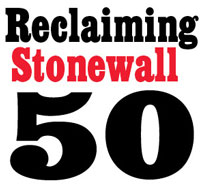 On the eve of our first Pride, we came out to each other as women. We hadn’t been close until that point, so it wasn’t obvious then that half a decade later, we would call ourselves sisters.
On the eve of our first Pride, we came out to each other as women. We hadn’t been close until that point, so it wasn’t obvious then that half a decade later, we would call ourselves sisters.
Sisterhood demands work and sweat and grit. By no means is it easy to extend trust, to care for another’s wounds. But now, we dream of growing into old aunties, sipping martinis on each other’s porches as Whitney and Dolly croon in the background.
It rained as we walked home from our first Pride. Surrounded by friends, we shimmered down sidewalks. Our sequins danced in color as they met vehicle headlights. It was a joy we’d never known.
Just steps away from our apartment, a car stopped. “Faggots!” flickered from the driver’s lips, and he sped off. The lesson was clear: Even at our most unapologetic, LGBTQ people can never escape the risk of being ourselves in public.
Fifty years after Stonewall, it would be remiss not to confront the conditions that ignited the uprising. At the time in New York, gay customers could legally drink in bars—a privilege they had won only a few years earlier—but kissing and dancing together was deemed disorderly conduct. The Mafia monopolized gay bars, charging exorbitant entry fees to dingy establishments. Despite payoffs to officers, the New York Police Department continued routine raids on the bars.
Police justified arrests by invoking the three-article rule, which made it illegal to be in public without wearing at least three articles of clothing conforming with one’s “legal sex.” While this rule might seem absurd today, its legacy cannot be untethered from today’s transgender bathroom bills or, say, the enduring absence of federal workplace protections.
This lineage of discriminatory legislation exemplifies how the state polices bodies that transgress heterosexual and gendered expectations. By restricting movement and limiting rights, such policies aim to remove us from public existence. They insidiously obstruct our access to each other and consequently, our ability to forge community.
Admittedly, community often feels like a wistful pleasantry. We aren’t the first or last generation unable to reach consensus on who this community encompasses or what to call ourselves. Even labeling the identities of historical figures through contemporary terminology can quickly veer into anachronism. Sharing exact experiences or identities, however, isn’t necessary to build a cohesive community.
Stonewall was messy. It’s why we can’t agree on what definitively happened. But we know those who fought back were misfits staked at the intersections of racial, gendered, and economic oppression. They were trans women and butch lesbians, sex workers, drag queens, and homeless youths—many of whom were black and Latinx.
Stonewall’s patrons had no inherent obligation to one another. Some of them probably didn’t even like one another. (Do we all like one another?) But in the heat of collective oppression, they chose to fight side by side. These outcasts danced in the face of danger, refusing to be anything other than free.
Despite notions of progress, heightened visibility has done little to erode institutional structures that still oppress our communities. State-sanctioned violence against LGBTQ people continues to pervade our carceral institutions, our military- and medical-industrial complexes, our laws that limit sex workers’ rights, abortion access, and housing and employment opportunities. Liberation is unattainable without ending all of these interconnected systems, including those that don’t directly target us.
When we came out, we didn’t know other trans women. It felt there was no one who could guide us through our transitions or show us how to exist. But we found kinship in many other others around us, spanning acronyms and spectrums. It’s not our identities or commonalities that bind us together. Chosen families care for one another, support one another through crises, challenge one another to grow, hold one another through mistakes, and fight for one another when no one else will.
This is undoubtedly easier said than done, but we don’t expect community building will ever be easy. It demands work and sweat and grit, daring us to interrogate the limits of our compassion.
As violence against those like us persists—as violence against those unlike us persists—our current LGBTQ community should heed Stonewall’s lessons. We don’t have to be the same. We don’t have to be perfect. We don’t even have to like one another. Our futures are not guaranteed, but these histories of resistance make it clear: We will not get free working alone.


